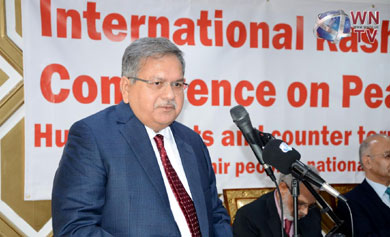
By Sultan Shahin, Founder-Editor, New Age Islam
22 June 2019
Numerous fatwas
(edicts) have been issued by ulema (Islamic scholars) across the globe,
particularly since 9/11 in a bid to stem the tide of Islamist terrorism. Tens
of thousands of ulema have endorsed these fatwas issued by influential
institutions of Islamic learning of all sects in India, Pakistan, Bangladesh as
well as other parts of the world. When issued, these fatwas inspiredgreat
expectations. As perceptive and insightful an observer as Mr. Ziauddin Sardar
proclaimed “the beginning of the end of the war of terror” when a hundred
thousand Deobandi ulema endorsed a fatwa issued by the hundred-year-old Islamic
madrasa in Deoband, India, “unequivocally denouncing terrorism,” in June 2008.
Similarly, Sufism-oriented Barailwis, hard-line Salafis, Ahl-e-Hadeesis, have
all denounced Islamist terrorism in their separate or joint statements. But
terrorist ideology continues to attract our youth, particularly in the Indian
state of Jammu and Kashmir. What used to be merely a Pakistan-sponsored
secessionist struggle is showing signs of tuning into an Islamist struggle for
the establishment of Islamic Sharia through a universal Caliphate, very much
redolent of the objectives of the so-called Islamic State or ISIS. Popularizing the slogan of “Shariatya
Shahadat,” a militant leader Zakir Musa, Burhan Wani’s successor, even
threatened to kill Hurriyat leaders for calling Kashmir’s separatist movement
political and not religious. Calling them “hypocrites, infidels, followers of
evil”, the militant had warned to chop off their heads to be hanged in Lal
Chowk in Srinagar, “if they create hurdles in the path of making Kashmir an
Islamic State”.
The most intriguing
question in this scenario is: why are fatwas of leading ulema of all Maslaks
(sects) so ineffective in stemming the tide? The fatwas are clear and
passionate in their condemnation of terrorism. The Deobandi fatwa, for
instance, should have been the most influential. Most militants in the South
Asian sub-continent, including the Taliban, are products of madrasas that can
be called Deobandi. The fatwa says: “Islam has taught its followers to treat
all mankind with equality, mercy, tolerance, justice. Islam sternly condemns
all kinds of oppression, violence and terrorism. It has regarded oppression,
mischief, rioting and murdering among severest sins and crimes. … In Islam,
creating social discord or disorder, breach of peace, rioting, bloodshed,
pillage or plunder and killing of innocent persons anywhere in the world are
all considered most inhuman crimes.”
According to this
fatwa, the very purpose of Islam, the fatwa says, is “to wipe out all kinds of
terrorism and to spread the message of global peace”. Muslims should not
co-operate with people who spread the lie of terrorism; and those who do are
“committing sins of oppression”.
Similar sentiments
were expressed in fatwas from Pakistan and Bangladesh, again endorsed by tens
of thousands of clerics from across these countries. Like fatwas given before
in Pakistan, the recent Paigham-e-Pakistan Fatwa issued on 20 January 2019 also
denounced all types of extremist ideologies and criticized the promotion of
sectarian hatred, called it mischief on earth and demanded the state to resolve
this critical issue with an iron fist. The forceful imposition of sharia -the
common practice promoted and followed by the terrorist organizations- and the
armed struggles against Pakistan have been declared Haram (Forbidden) under
this fatwa. The fatwa declared suicide haram and jihad only a state’s
prerogative. Scholars from all Islamic schools of thought stated that suicide
attacks have been forbidden by the Qurʾān and they have been
termed as Haram (Strictly Forbidden). Hence, the ones involved in such horrific
crime must be considered rebels and Khawarij and shall be punished to the
greater extent. Furthermore, according to the Islamic teachings this fatwa also
supported military operations aimed at eradicating extremist and militant evils
out of this society.
In a similar vein.
the fatwa issued by over one lakh Bangladeshi Islamic scholars in August 2016
declared militancy and extremism in the name of Islam haram or 'forbidden'. The
'fatwa' was signed by some 1, 01,524 Islamic scholars belonging to Bangladesh
Jamiatul Ulama.
The fatwas declared,
“killing of innocent people indiscriminately is not permissible in Islam,
killing of children, women, old and weak people who do not take part in a war
is strictly forbidden in Islam. Even killing of these kinds of people during
war is not allowed in Islam. Killing of people during prayer is a heinous and
severe crime.
While presenting the
fatwa before the Press, Maulana Fariduddin Masoud, chairman of Bangladesh
Jamiatul Ulama said: “Islam is a religion of peace. In the name of Islam, some
quarters are spreading extremism and terror through misinterpretation of Qurʾān and Hadith
to gain their personal interests. Though many label the militants as jihadis,
they are actually terrorists. Islam doesn't support terrorism. And those, who
are carrying out suicide attacks with the belief to go to heaven as martyrs if
they die and live as heroes if remain alive, will not go to heaven according to
Qurʾān and Hadith.
The participation in Namaz-e-Janaza for those religious terrorists,
militants and secret attackers is also forbidden. And those who will die taking
stand against these militants will be regarded as martyrs,"
These are all severe
condemnations of terrorism. Then why do these fatwas have no influence on the
section of our youth which listens to the militant ideologues’ rhetoric. Almost
40,000 foreigners joined the so-called Islamic state, from around the world,
and, of course, it is safe to assume that many more must have wanted to join
but couldn’t due to logistical difficulties. Travelling to a so-called state
which was not really a state recognised by even one member of the global
community was not easy. Where does militant ideology’s appeal come from and why
are the passionate efforts of all our ulema not so successful? This is a
question that needs to be pondered upon seriously, if we are to stem the tide
of militancy from the Muslim community.
A close reading of
these fatwas reveals that while these are all long on rhetoric, they are short
on details and specifics, the terms in which militant ideologues talk. The
influential militant ideologues like Syed Qutb, Maulana Maududi, Abdullah
Azzam, Anwar al-Awlaki, Aiman al-Zawahiri, Osama bin Laden, all of them make a
persuasive case of their militant ideology, comprehensive, internally
consistent and coherent, based on solid foundations of Qurʾān, Hadith and
events of Islamic history, particularly actions of the companions of the
Prophet (s.a.w) and the Salaf ul Saleheen. Apart from these, the militant
narratives are also based on universally accepted theological doctrines of
Uncreatedness of the holy Qurʾān, universal
applicability of all exhortations of Qurʾān and Hadith,
Abrogation of early Makkan verses preaching peace, co-existence, patience in
times of adversity by later militant Madinan verses of war, exhorting Disavowal
and Dissociation with Idolaters and subjugation of People of the Book,
punishment of death for blasphemers and apostates, etc.
On the other hand,
most of the counter-narratives of clerics, proclaiming Islam as a religion of
peace are one-liners. If at all they quote Qurʾān, they quote
just one verse (5:32) which says killing even one innocent person amounts to
killing humanity and saving one person amounts to saving humanity. The rest is
rhetoric. Strong, passionate rhetoric, absolutely, but just that -- rhetoric.
There is only one fatwa among the many which takes up the issue in some detail.
It’s the fatwa from Bangladesh Jamiatul Ulema. It at least acknowledges a
coupleof the many militant verses that are repeatedly used by radicals in
justifying violence. But it again makes the same familiar mistake of countering
it by quoting early Makkan verses advocating patience in the face of adversity.
The madrasas that these clerics run teaches books like Itqan fil Uloomul Qurʾān,
Tafsir-e-Jalalain, Hujjatullah al Baligha,
etc in which Tehreef fil Qurʾān Naskh, Mansookh,
etc are discussed in great detail, giving credence to the radical narrative
that verses exhorting peace in early Islam were abrogated by later verses of
war. Indeed, there is a widespread view that one sword verse 9: 5 alone has
abrogated 124 early Makkan verses, exhorting peace, tolerance, pluralism,
co-existence, patience, etc. And there are something like 164 verses of war
that were revealed later in Madina, which have by virtue of having come later
abrogated earlier verses. This argument of progression of the duty of Jihad has
been taken to a point where verses 9:5
and 9:29, asking Muslims to kill the Mushrik and subjugate ahle kitab, are
supposed to have abrogated not only verses teaching patience in Makka -- Inna
Allah ma as-Sabireen, God is those who are patient (2:153), 11:49, 50:39,
39:10, 70:5, 15:85, 15:85, (39:10, 70:5 -- but even verses 22:39 and 2:190,
permitting the use of force in self-defence. Offensive jihad has thus become an
obligation for every Muslim in the view of several authorities. Even a Sufi of
the highest order like Imam Abu-Hamid al-Ghazali says that Muslims should go on
Jihad at least once a year. Obviously, this Jihad can only be offensive in
nature.
The fact of the
matter is that in every war, once a decision has been taken to go to war,
people are motivated to fight, rewards are announced, punishment is prescribed
for disobedience and so on. But once the war is over, these instructions are no
longer considered applicable. Our tragedy is that under the Doctrine of
Uncreatedness of Qurʾān and the
Doctrine of Abrogation, these last verses of war in SuraTaubah like 9: 5 and 9:
29 have become the pre-eminent teaching of Qurʾān in matters
of war and peace and relations of Muslims with non-Muslims. The general
acceptance of Blasphemy and Apostasy as crimes punishable with death has taken
even intra-Muslim discord to a new height, resulting in takfeer of entire
communities and killings.
Thus, we Muslims are
stuck in a situation where the radical war-mongers have an upper hand. This
situation is exacerbated by the fact that ulema are not yet prepared to come up
with a genuine counternarrative. They seem to think that passionate rhetoric
will do the trick. I do not doubt their intentions. But when a strategy fails,
one has to think of the next step. In my view, the following declarations will
have to be made forcefully and repeatedly by ulema around the world for the
tide to begin turning.
1. Qurʾān has been
created by God. It is a collection of verses that were revealed to Prophet
Mohammad (saw) initially in Mecca, as instructions into the universal faith
that has been coming to humanity since the advent of Prophet Adam (AS) on
earth, through a series of prophets of equal status (Qurʾān 2:136) sent
to all nations, bearing the same message. So, these initial verses that teach
us peace and harmony, good neighbourliness, patience, tolerance and pluralism
are the foundational and constitutive verses of Qurʾān. They
constitute the fundamental message of Islam. But Qurʾān also
contains many contextual verses that were revealed as instructions from time to
time for the Prophet (saw) and his companions to deal with difficult
existential situations that arose as both the Mushrikeen (pagans) of Makka and
Ahl-e-Kitab (People of the Book) living in Madina mostly refused to accept the
message of God coming to them through the Prophet, and decided to eliminate the
Prophet and his few companions. These verses are of great historical importance
and tell us the near-insurmountable difficulties the Prophet had to face to
establish our religion. But despite their importance they are no longer
applicable to us as instructions of war, over 1400 years after the wars were
fought and won by the grace of God. We are not engaged in any war now.
2. The Doctrine of Abrogation, as defined by
radical ideologues today, is a false doctrine. God cannot be giving orders only
to abrogate them later, except that some orders may be simply meant to have
temporary application as in the case of war-time instructions.
3. God does not prescribe any punishment for
blasphemy and apostasy. Nor does He authorise any human, a ruler or scholar to
punish any one. So even if there is fool
proof evidence that someone has committed these crimes, the punishment has to
be left to God.
4. We are now living in the world of modern
nation-states; our international relations are guided by the charter of United
Nations which has been signed by virtually the whole world including all Muslim
majority states. It is simply not
possible today for any state to conquer new territories and establish its rule
there as was the norm until the first half of the twentieth century. So, all
talk of performing Jihad at least once a year should cease, even if it was
indeed mandated by Qurʾān and Hadith.
It is simply impractical and God does not ask us to perform impossible task.
5. There is no
scriptural sanction for the call of a global Khilafat of Muslims either in
Quran or Hadith. Modern pluralistic states are very much in tune with the first
Islamic State evolved by Prophet Mohammad (pbuh) under the constitution
provided by Meesaq-e-Madina. Muslims do not need a global Khilafat, though
Muslim-majority countries can cooperate more fully in the spirit of brotherhood
sanctioned by Quran and even form a commonwealth of Muslim states.
6. Modern Democracy
is a fulfilment of the Quranic exhortation of amrahum shoora bainahum.
SoMuslims should try and strengthen Democratic institutions in the countries
where they live either as a majority community or as a religious minority.
7. Let us all accept that Islam is primarily
a spiritual path to salvation, one of the many (Qurʾān 5:48) sent
by God to humanity in different ages through different prophets, all of equal
status (Qurʾān 2:136,
21:25, 21:92). God has asked us to compete with one another in performing good
deeds [Qurʾān 2:148,
23:61] and that is what we should be focussed on. As Qurʾān came to
confirm all previous faiths, we can only respect and accept all other religions
as paths to the same divinity. The Doctrine of al-Wala wal-Bara as propagated
by radical elements is misconceived and impractical in the present highly
complex and intricately interwoven global society.
I hope Ulema as well
as common Muslims will consider these points in the spirit of consultation in
which it is being presented and a consensus will gradually evolve.





